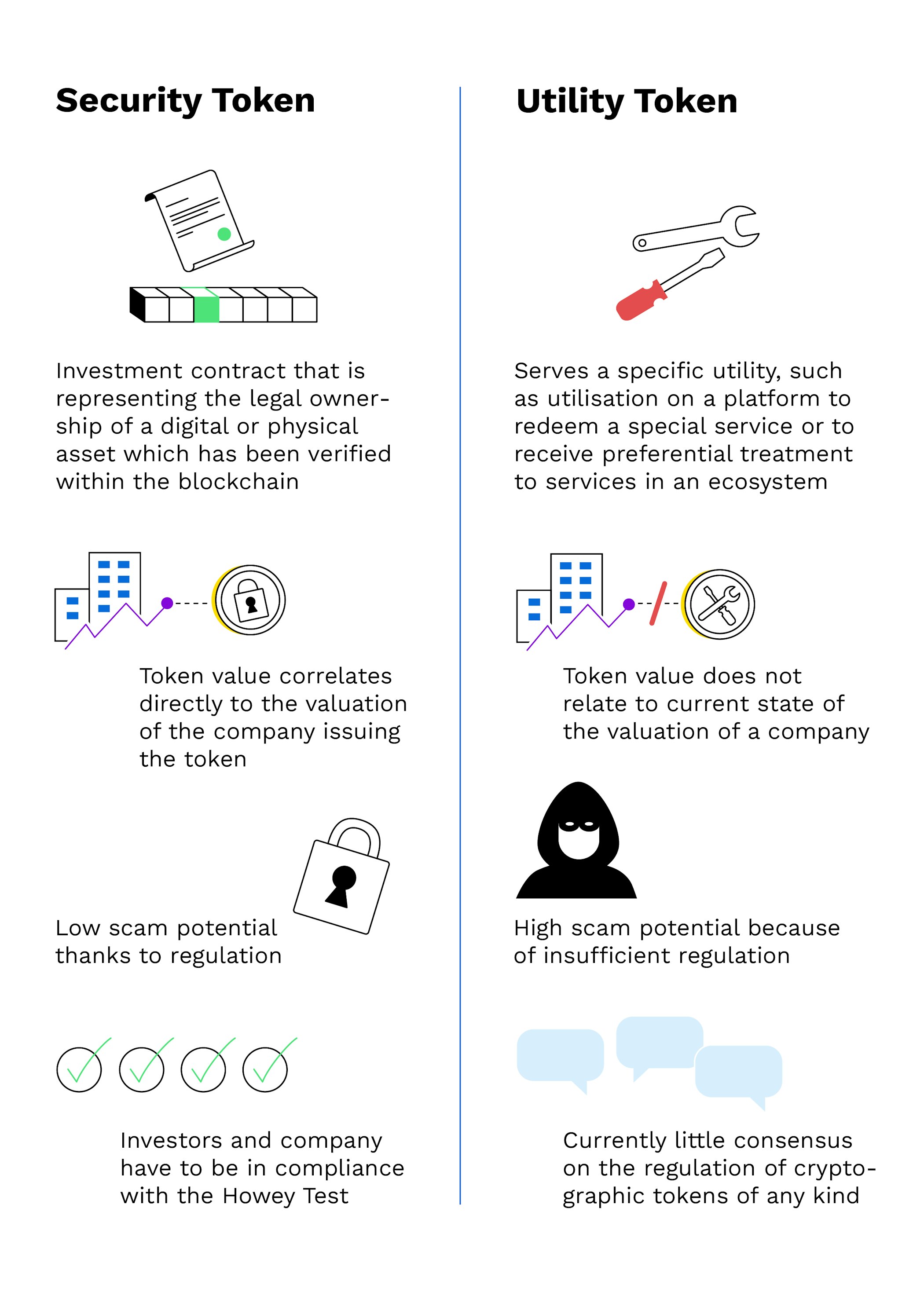
What is the difference between Utility Tokens and Security Tokens?
Right now, Ethereum provides the most trusted and most used platform for external token projects, though others are gaining traction as well.
Unlike cryptocurrencies, which utilise their own blockchain, most tokens run on a blockchain that is already in place
The Ethereum blockchain is presently the most popular blockchain for the utilisation of ERC20 tokens
Smart contracts are used to gather existing tokens and to issue new tokens
Tokens are mainly used as a payment method for services, as voting rights in ecosystems or as digital assets
The regulatory status of tokens is still up for debate in most countries
In this article, you are going to learn about the difference between utility tokens and security tokens.
Most cryptocurrencies are based on their own blockchains. In some cases, such as Ethereum, tokens are regarded as separate projects that utilise the functionality of an underlying blockchain as starting point for their own developments.
Security Tokens
A security token based on blockchain technology is not to be confused with the security token that you need to access a sensitive network system such as a bank account. Also called an “investment token” or “equity token,” in the realm of blockchain technology a security token is a cryptographic token that is tied to a securities offering.
Rather than granting a tangible benefit for an investor such as access to an ecosystem, a security token represents a share in the company issuing the token. Investors who buy such tokens hope to turn a profit from investing. Security tokens utilise the speed and efficiency of blockchain technology while benefiting from regulatory measures by governments offering increased protection from fraud.
In the United States, the Securities and Exchange Commission (SEC) is the authority in charge of regulating how a security is classified. The SEC also stipulates how companies should disclose their securities offerings. The Howey Test is a methodology used to determine whether putting money into a business means you have “invested” in it.
Security tokens utilise the speed and efficiency of blockchain technology while benefiting from regulatory measures by governments.
The Howey Test was instituted by the US Supreme Court in 1946. It defines an asset as a security if "a person invests his money in a common enterprise and is led to expect profits solely from the efforts of the promoter or a third party."
Utility Tokens
Utility tokens, on the other hand, serve a specific utility. Such a utility may be that tokens can be used on a platform to redeem a special service or receive preferential treatment to services. Utility tokens make up the majority of tokens issued in the scope of ICOs. They are primarily used by companies to raise interest in their products, and for application and value creation in services provided in blockchain ecosystems.
In contrast to security tokens, investors are not offered an actual stake in the monetary ownership of a company if they buy utility tokens. Therefore, utility tokens are not created as an investment opportunity in the original sense.
Utility tokens are primarily used by companies to raise interest in their products and for application in blockchain ecosystems.
Still, there is a common misunderstanding that when the number of people using a utility token increases, the value of the token will increase as well. In fact, a utility token’s investment value correlates to the actual demand for the utility token. As token availability is capped, token value is expected to increase in line with rising demand. If a token is tied to a DApp, the scaling up of a network may increase the value of a token.
New to Bitpanda? Register your account today!
Sign up hereRegulatory issues
Around the world, the development of open banking is still in its early stages. Security tokens as well as utility tokens based on blockchain technology are expected to play an important role in the future of the digitisation of capital markets. However, currently, there is little consensus on the regulation of cryptographic tokens of any kind.
Regulatory agents in different countries are taking divergent approaches on how to classify cryptocurrencies and tokens in terms of due diligence requirements. Supervisory authorities around the world working towards clarification and coordination on a global scale remain essential ingredients in ensuring continued growth and innovation in the fintech industry.
Are you ready to buy cryptocurrencies?
Get started nowDISCLAIMER
This article does not constitute investment advice, nor is it an offer or invitation to purchase any crypto assets.
This article is for general purposes of information only and no representation or warranty, either expressed or implied, is made as to, and no reliance should be placed on, the fairness, accuracy, completeness or correctness of this article or opinions contained herein.
Some statements contained in this article may be of future expectations that are based on our current views and assumptions and involve uncertainties that could cause actual results, performance or events which differ from those statements.
None of the Bitpanda GmbH nor any of its affiliates, advisors or representatives shall have any liability whatsoever arising in connection with this article.
Please note that an investment in crypto assets carries risks in addition to the opportunities described above.
